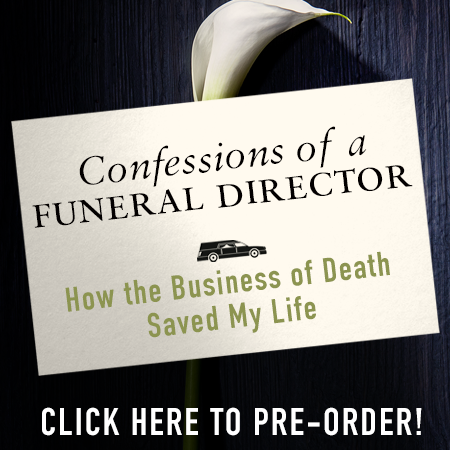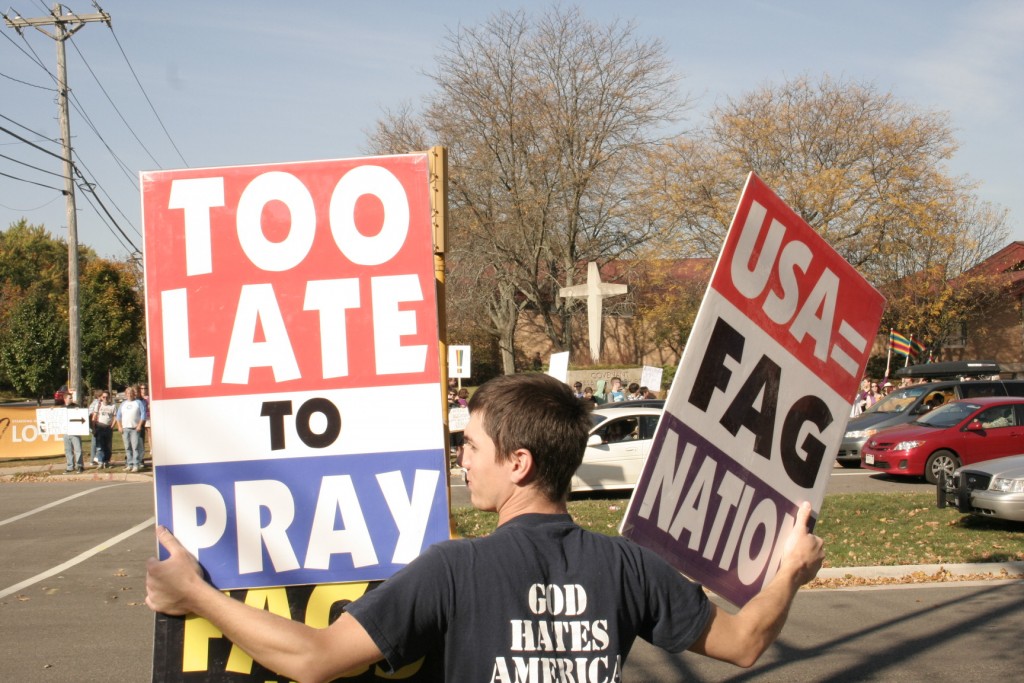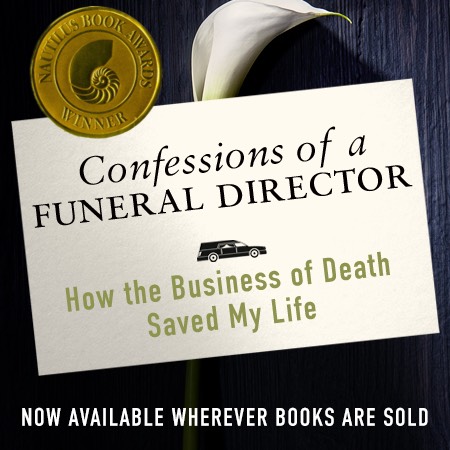Caleb Wilde
(218 comments, 980 posts)
Posts by Caleb Wilde
10 Pieces of Advice for New Funeral Directors

One. Nobody who “wants” to be a funeral director will make it.
It isn’t something you want in the way that you want a boy/girlfriend or a new car. No. It’s more like marriage. It’s a commitment that’s intended to last. It’s not a job … nor is it just a profession … this business is a lifestyle. And if you’re not ready to marry it, then move to another job that demands a less committed relationship.
Two. Dress Above Your Station
I’m always impressed by a funeral director who dresses well. Find a good tailor, buy good shoes, spend extra on that suit that fits you really well, keep your hair in shape and smell good. It might cost you money that you don’t have, but it will pay you back in confidence and numerous good-humored flirtatious advances from people three times your age.
Three. In the words of Aaron Burr, “Smile more. Talk less.”
What made Hamilton cool is that he didn’t care about his image, he cared about his legacy. Burr was the antagonist only because he cared about his image and never forfeited that image for something lasting. But Burr’s adage of “Smile more. Talk less.” isn’t all bad per se. It may have been bad for Hamilton, but for those of us in the funeral industry, it’s pretty good advice.
Four. Don’t try to be a perfect professional
One of the common pitfalls I see in young funeral professionals is that they’re entirely too stressed out in their pursuit to be the perfect funeral professional. Families don’t want you to be stressed out. They don’t need a perfect funeral director. They need you to be calm, in control of your stress and ready to be present. It’s hard, I know because I was once that stressed out “professional”, but somewhere along the way I stopped trying to be a consummate “professional” and it was then, and only then, that I really started being present and helping families.
This also means that you know your knowledge boundaries. Direct those questions outside our professional knowledge to the people who are qualified to answer. We aren’t lawyers, doctors, grief counselors or theologians. And when we don’t know an answer to a funeral question, ask a mentor. It’s okay if you don’t know an answer; what’s wrong is when we let our pride get the better of us and we act like we do.
Five. You will get used to the schedule
When you first start in this business, ITS SOOOOOO DAMNNNN TOUGHHHHHHHHH!!!!! The holidays. The weekends. It even takes our nights! And after it takes our weekends, and our sleep, it tells us to get back up at 7 AM because there are two funerals we have to work the very next day. It really does take awhile for our bodies and minds to get used to the schedule. Sometimes our bodies and minds need help getting used to the schedule. Sometimes we might need a psychologist. Sometimes we might need a fitness instructor. But most times we just need a good nap. If you stick to it, you’ll eventually be able to keep up.
Six. Allow yourself to learn patience
Have you ever been around grieving people? At times grieving people act like they’re out of their minds. And, there’s times when grieving people can act … well … they act kinda crazy. And it’s their right. In fact, it’s the reason WE exist. Their world has been pulled out from under them, they haven’t a foot to stand on and everything that they used to know is suddenly … gone. And you’re here to help create semblance in the crazy.
It can be tough to learn patience, especially when we’re working on small amounts of sleep and are arranging multiple funerals at once. But it’s something we have to do.
Seven. Continually remind yourself why you’re here
The secret to learning patience, to getting used to the schedule, to finding resilience during the tough schedule is this: Learn to love serving others. Probably the best means to cope with the funeral business is found in the people we serve. Love them intentionally and don’t be afraid to find joy in meeting their needs. Don’t be afraid to hear their stories and become part of their family.
Eight. It takes a while to grow into this business (in other words, have patience with yourself)
Generally, you work with older people and older people prefer to work with people within their generation. It can be hard for a younger person to establish themselves in this business, but it’s very possible. There are no Mark Zuckerburg 18-year-old prodigies in funeral service because being a funeral director is about life experience, not business acumen.
Nine. Find a Mentor
This doesn’t have to be anything official. You don’t have to update your Facebook status to “in a mentor relationship with ….” Find someone you respect in this profession, someone who has more experience than you do, someone who is willing to answer your numerous question and stick close to that person (it’s best if you work with that person). At one time, this industry was a trade; in other words, it wasn’t taught in schools and regulated by state boards. It was a trade that was taught by a mentor to an apprentice and the skills and business acumen were passed down through word, practice and in house training. I do believe that the best funeral directors are still being produced when they treat this work like a trade. They find a mentor, and they learn by the guidance of someone older and wiser.
Ten. Learn to practice self-care
I’ve been close to being burnt out. Landed in the hospital. Reevaluated life. I started to see a psychologist. I started anti-depressants. I started writing more. I started going to the gym more. Saying “no” more often. I started to realize that if I wanted to take care of others, I had to take care of myself. Self-care is the unselfish act of selfishness and I know for a fact that I’d be out of this business if I didn’t practice it.
If you’re a new funeral director (or you want to be one), I do believe you’ll gain a lot of perspective from my book. It’s a transparent and personal look at the rigors of being a funeral director.
10 Simple Ways to Avoid Being an Asshole around Death
One. Don’t use a death as an object lesson
The first piece I ever wrote for a magazine was about the death of Jackass crew member Ryan Dunn and how people were using his reckless driving death as an object lesson.
Even though it’s tough to do, especially when we want to teach our kids a lesson about “why drugs are bad” and “why you shouldn’t drink and drive”, turning a life into an object lesson grades against the heart of what it means to be human. People aren’t objects. And death isn’t a lesson. Death is this cauldron of feelings, loss, void, laughter, fear, … it’s everything that is human. Let’s keep it that way.
Two. Remember the Circles of Grief
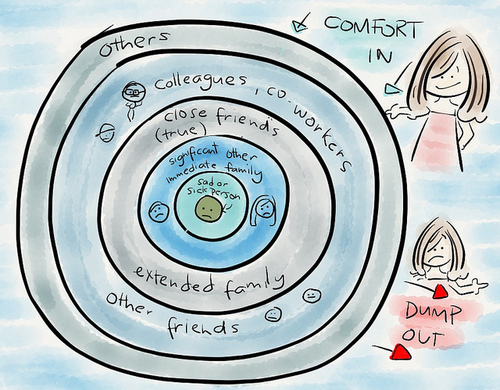
The circles of grief (AKA the Ring Theory) is this: Imagine concentric circles (see photo above). The smallest ring in the center is the person closest to the deceased, whether that person is the deceased’s spouse, a parent, a child or all of the above. The next circle is representative of the immediate family and very close friends. A third ring could be extended family, close co-workers, etc. A fourth ring might be schoolmates, or church acquaintances, etc. The rings keep going.
The idea with the circles of grief is that comfort always goes in, and dumping always goes out. If you’re a secondary relationship, it’s not your right to dump all of your grief on the spouse of the deceased. If you’re a fourth ring relationship, you should NOT expect a close friend to comfort you. If you’re the closest to the deceased, it’s okay if you dump outward. And if you’re an outer ring, you should expect to comfort the inner rings. These circles act as a great template for any of us who are ever in a position to comfort the bereaved. If you act otherwise, you’re probably being an asshole.
Three. Avoid cliches
When people use comfort cliches like “you’ll see him again someday” or “things will get better”, they are often more concerned with comforting themselves than comforting the bereaved. Comfort cliches are the practical outpouring of death denial. Cliches are band-aids that people try to put on a massive wound. These band-aids oversimplify the problem, they minimalize grief and they trivialize the death. If you don’t want to be an asshole around death, avoid them at all cost.
Four. Don’t Join Westboro Baptist Church
Just saying.
Five. Don’t Say or Write Negative Things about the Deceased
This is simply death etiquette. It doesn’t matter if the deceased was the worst bastard you’ve ever known, it’s never cool or respectable to take a shot at someone when they can’t defend themselves. And nobody is more “unarmed” than when they’re dead.
Six. Don’t Fill Silence with Words
“The real art of conversation is not only to say the right thing at the right place but to leave unsaid the wrong thing at the tempting moment.” —
Dorothy Nevill
When you’re around grief, sometimes you speak too soon, so you decide to wait in silence. Your friend starts to cry. You respond to her tears with your own. Even though you want to respond with words, you know this isn’t the time for words. There are no perfect words here. There’s no perfect anything here. And so you wait.
You stay. Listen. Silence. You take her pain into your soul. Hours pass.
You’ve spoken, not with words or advice; not by trying to solve the problem; nor by placing a limit on your time. You’ve taken the uncomfortable silence, allow the grace for tears, for brokenness; you’ve allowed yourself to sit in the unrest without trying to fix it.
Seven. Don’t Make the Funeral about You
This past Saturday night, I stood there behind the register book, striking up a conversation with people as they enter the sanctuary. The viewing line snakes around the church, down the hall, and into the basement as we try to extend it through the corridors of the church so as to keep the line from going out into the hot and humid weather of a Pennsylvania summer. The family of the deceased is taking their time, talking to each and every person who has come out on this sweaty night.
“Other funeral directors stand by the family’s receiving line and tell them to keep their conversations short and simple”, one person stated.
“We don’t do that”, I said politely.
Another couple comes through the line and complains that they’ve been standing in line for half-an-hour AND by the look of things, they’ll probably be in line for another half-an-hour. “Can’t you do anything?” they beg.
After having this conversation about 10 times over the next hour, I’m getting tired of my joke and I’m getting tired of people complaining.
I want to pull them close to my face and whisper, “This isn’t about you.”
Perhaps the greatest loss that comes with the drone of our busy lives is that in losing silence, we’ve lost patience, and in losing patience we’ve become so inherently selfish that when we go to a funeral we forget that it’s not about us. Too many of us have become funeral assholes.
Eight. Don’t Use Death to Evangelize
Our funeral home’s website has online obituaries for those we are serving. When someone goes to an obituary on our website, they can write out condolences and post it for the family of the deceased. A couple years ago we had to ban about five users who went to every one of the obituaries and left a “condolences” that said something like this: “Although we don’t know you, we are sorry for your loss. Use this time to contemplate your salvation and your relationship with Jesus.” These “condolence evangelists” may have been well-intentioned, but they totally missed the point.
The point is to remember the deceased and be near to those who loved and lost. The point isn’t to “get people to heaven” but to bring heaven down through love, community and lots of really good comfort food.
Nine. Be Culturally Sensitive
We all know that when somebody dies, bacon is by far the best dish to bring the grieving family … unless that family is Jewish or Muslim. We also know that cremation is a viable option, but let’s not preach about the sins of embalming and the environmental impact of a full burial to an Eastern Orthodox family. Don’t be THAT asshole.
Ten. Avoid Grief Timelines
Validate, validate, validate. It’s okay if somebody is grieving years after they lost their spouse. It’s okay if their grief expressions look different than yours. Sure, some grief might need the help of professionals, but that doesn’t mean the grief is wrong or sick. And because we validate, we never, never, never say, “Well, you should be over this by now!” or “you’ve been grieving for two years now, it’s time to move on.” There is no timeline for grief, but there is no timeline for love. We let love express itself and we validate that expression (unless that expression is cutting off the heads of cats and using those heads to make a mosaic of the deceased’s face. At that point you call Dr. Phil.)
*****
If you like my writing, consider buying my 2017 Nautilus Book Award Gold Winner, Confession of a Funeral Director (click the image to go to the Amazon page):
10 Subculture Funerals that Would Be Really Cool
One. Nudist Funeral.
From an embalming perspective, laying out a nude nudist for a viewing would be difficult. Displaying a naked body for a viewing would mean that I’d have to hide all my sutures through some expert waxwork, and I’d have to make sure the embalming fluid was evenly distributed to stave off any odd discoloration. Generally, if an embalmer gets good distribution and an even color in the head and the hands, we’re good, because the head and the hands are the only parts of the skin visible for the viewing. Even in a thoroughly embalmed body, there might be some discoloration in the feet, or other parts of the body. But, it’d be a fun challenge and would demand that I’d do some of my best work.
Two. Trekkie Funeral
“Beam me six feet down, Scotty”
Three. A Furry Funeral
This would be the exact opposite of a nudist funeral because no skin would be showing if the deceased wanted to be embalmed. If the disposition was cremation, we’d get one of those Teddy Bear Urns.
Four. Cosplay Funeral
So many ideas! If the deceased wanted to be Wonder Woman, that whole even distribution thing would come into play. If the deceased wanted to be dressed as Nintendo’s Mario, it’d be easier. The casket could even be made to look like a Mario Cart. If I was working the funeral, I’d probably dress up as Gomez Addams or a suit-clad Dracula (“I vant to drain your blood!”).

Author: Fernando Branquinho
Author URL: https://www.flickr.com/people/aki_jazz/
Five. A Drag Funeral
I’d totally dress in drag for the funeral, but I’d probably go for a David Bowie gender blending look to maintain a level of distinction. Dressing a deceased person in drag would be beyond my capability. I’d find a friend of the deceased in the drag world to help with the dressing and makeup, but Lord knows I probably don’t have enough makeup in the prep room to pull it off.
Six. Juggalo Funeral
Nope. Wouldn’t do this one.
Seven. Steampunk Funeral
This would be so fun. The things you could do to a casket to make it steampunk. I’m getting excited just thinking about it. You could make a really elaborate locking system with a weighted lid so that you’d click a button and the lid would lower and lock in place. Click it again, and the lid would rise on its own. But, if you’d make something this awesome, it’d be really hard to bury it beneath the ground.
Of course, this steam powered hearse would be an absolute must.
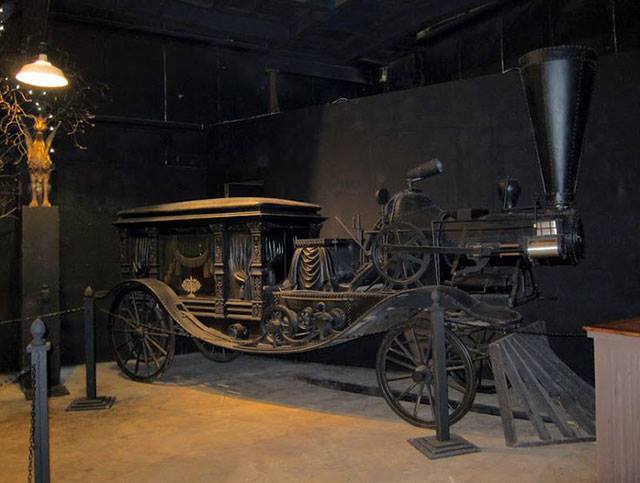
Eight. Neo-Victorian Funeral
This would be boon for me because the Victorians were known for their absolutely lavish funerals. Sell alllll the copper caskets! Do you want two Prometheans? How about a vault made out of gold?
Nine. Bro Funeral
I’d mix a little “extra tan” dye in the embalming fluid to give the bro that sun-kissed look. I’d have the image of Ryan Lochte painted on the casket lid. The deceased would be dressed in Southern Tide flannel shirts, and John Mayer would be playing during the viewing. Once the bro slice would be buried, all his bros would pour beer on his grave while chanting his fraternity motto.
Ten. Bodybuilding Funeral
ADD SOME PROTEIN POWDER IN THE EMBALMING FLUID! Turn up the pressure on the embalming machine and get those arteries and veins distended. Turn on the workout music for the viewing. We’d only need one pallbearer who could deadlift the casket and snatch walk it all the way to the hearse. But really, who needs a hearse when you have men who could throw
If you like my writing, you might like my book:
10 Things Funeral Directors Do to Chill
One. We Hobby Hard.
Nearly ever funeral director I know has a hobby. I know a clay sculpture, an antique car restorationist, a golfer, a dragster driver, a pole dancer, exercise fanatic, a colonial home restorationist. Most everyone has a hobby, but it seems funeral director invest themselves heavily in their hobbies to provide a respite from their job.
Two. We Party Harder.
I’m not a partier, so you can count me out of this group. But I think I might be an exception.
A couple years ago a casket company flew me and about 20 other funeral directors to their casket-making plant. During the day, we would walk around the plant and get all the details about how caskets are made. During the evening, we’d be bused back to a lodge, a lodge that had an open bar. There was a lot of libations, as seen by the numerous drinks sitting around us in the photo below. A couple years before, my dad went on the very same trip and he said a couple directors got so drunk they were dancing on tables. Good times.
I’ve always said, there are few things in life more interesting than a drunk funeral director.
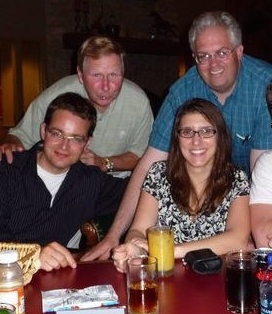
Three. We Probably Don’t Have Many Deep Friendships
The schedule of our work can be very rigorous. And free time can be hard to come by. Sometimes we don’t get to see our families and the little free time we have, we want to spend it with our partner and children. And sometimes we just have to say “no” when you invite us out to dinner or to a ball game. But don’t be hurt by our “no” and please keep asking us to visit with you. Funeral directors need friends too, it’s just not always so easy for us, or you. Which leads me to number four …
Four. We Tend to be Home Bodies
When I get home from a long day at the funeral home, I just want to stay there. One of the reasons we like to stay home is that we’re often on call. And nothing sucks more than going out only to be called back in.
Five. Our Social Lives Tend to Be Invested in Social Clubs
Social clubs are perfect for funeral directors: there’s often drinks, there’s a bunch of potential clients and we don’t have to get too deep with anyone. Win, win, win.
Six. Gardening Is a Thing
Gardening is another win-win situation for funeral directors. One, gardening is relaxing and peaceful; and two, you can do some gardening at the funeral home and make it look pretty.
Seven. We Might Embalm Road Kill
When my dad went to funeral school, one of his classmates would embalm roadkill as an enjoyable pastime.
Eight. Church(es)
Churches have the win-win situation like social clubs, although without copious amounts of liquor (unless you really imbibe the Lord’s blood). I know a few funeral directors who frequent a couple churches because nothing spells “good business” like exploiting the Lord’s people.
Nine. We Make a Bunch of Kids (and enjoying practicing)
Sex. Most people like it. But, I’ve noticed a proclivity in funeral directors. They really like it. Maybe it’s a way to let off steam. Maybe all the death pushes us to do things that make us feel alive. Maybe it’s just a great way to exercise without having to buy any exercise equipment. But, yeah. We’re a horny bunch.
Ten. We write stuff
Sometimes blogs. Sometimes books. You didn’t see that sales pitch coming, did ya?
Al’s Soul Is in that Damned Bird!
My phone rang early in the morning, waking me up to the sound of the coroner on the other end explaining Al Johnson was dead in the second story bathroom and Mr. Johnson’s family was ready for us to come and get him. It was one of those calls that was close enough to breakfast time that I had to stop and think, “Do I grab some breakfast now, or do I wait until I get back from the house removal?” I forget what I did that morning. I probably went with the easy option of a breakfast bar instead of my normal protein and banana shake.
I called Nathan, the funeral home’s apprentice, who always sleeps right by his cell phone. “Hello,” he said before the phone even rang. His voice was groggy like mine had been only a few minutes before when the county coroner had called me and woke me up from sleep. “We have a house call and I’m going to need your help. Second floor. The coroner says it’s going to be a tough one. So eat your Wheaties”, I joked, something that isn’t always a great idea at 5 AM in the morning.
A few minutes later I was dressed and driving over to the funeral with a breakfast bar in my mouth.
Nathan and I arrived at Al’s house to find some EMT vehicles and the coroner’s Suburban. We parked as close to the back door as possible so as to make our removal as short as possible. We knocked on the door and we heard a voice, very loud and very clearly say, “Come in.” It was an odd voice, not entirely normal but human enough that we opened the door. We were quickly greeted by Al’s widow Liz who came to us with arms open for some hugs. I embraced her, she started crying and in between the sobs, Liz told us how she found Al in the bathroom early this morning. “He’d be saying he was tired lately, but I figured it was just this hot weather that was wearing him down” she recalled.
Liz pointed upstairs and just as she did I heard that same weird, humanlike voice from the other room say, “I’m hungry. Feed me.” Liz didn’t comment on the voice so I poked my head around the corner and saw a parrot. He looked at me and repeated, “I’m hungry. Feed me.”
“I think your bird’s hungry,” I said in jest to Liz.
“My bird? No, no. That’s Al’s bird.”
Some of the EMT crew followed us upstairs because they knew that getting Al downstairs wouldn’t be easy. As we were going up, the Parrot kept saying, “Hey, girl. Whatcha doing?” It repeated that phrase at least a dozen times every time it heard us doing something upstairs.
When we pulled Al off the toilet, it was followed by “hey girl, whatcha doing?”
When we slide his body to the stretcher. “Hey girl, whatcha doing.”
And on, and on, and on until we got Al out of the house and into our van.
It was weird for Nathan and me, but for Liz and the family and friends that were at the house, this talkative Parrot seemed a normal part of their life.
Nathan and I came back in, grabbed some paper towels and Clorox spray, cleaned Al’s blood up from where he bumped his head on the sink, gave the widow a hug and that was the end of the story. Al was eventually cremated.
That story happened a couple years ago and it has stuck in my mind because of the Parrot. That was the first and only time there’s been a talkative Parrot involved in a house removal.
Today, we had a prearrangement appointment at the funeral home. I didn’t make the appointment and I didn’t know who was coming in. One o’clock came along, the doorbell rang and my dad yelled, “Caleb! I’m on the phone. Can you get the front door?” I walked down the steps from my office and there was Liz standing at the front door waiting for me to let her in.
“Hey, Caleb!” she said as she gave me a hug. It took me a minute, but my mind started to piece everything back together. I remembered the call. I remembered Al on the second floor. And I remembered that Parrot.
I sat her down and we started chatting while we waited for my dad to finish his phone conversation. Dad was the one who was going to make the prearrangements with Liz.
“How are you?” I started out.
“Good! Do you have any whiskey?” she asked. “No,” I said, “but do you need some?”
“Oh, my. I could use some. This whole thing of prearranging my funeral has all my memories of Al coming back to me.”
We talked about Al for a minute or two and then I brought up the bird.
“Oh, God. She said. I love and hate that damn bird. That bird was Al’s for 15 years. He got it after he retired. That thing came to mimic all of his sayings. Everything like, ‘Can you turn the TV on, honey?’ ‘I’m hungry, feed me’ (which Al said as a joke), ‘Come in’. The bird even knows the right context for its sayings. Like if I’m upstair working on something, Al would say, ‘hey girl, whatcha doing?'”
“I hated that damn bird for 15 years, but now it sounds like Al, it talks like Al and it’s a daily reminder of Al. Al’s soul is in that damned bird” she joked. “As much as I’ll enjoy the peace and quiet when it dies, I dread that day.”
A minute later, my dad walked in, the conversation changed and I walked out of the room.
If you like my writing, please consider preordering my book.
